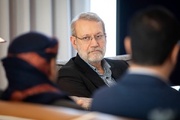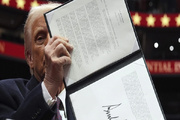Arab League secretary general says U.S. rhetoric against Iran and Syria will not secure Washington's interests as it will step up tension and instability in the region.
"Iran is the important and influential state of the region and without Iran's participation, regional problems will not be settled," Amr Moussa told Mehr News Agency.
"No one will benefit from tension and crisis in the region," the Egyptian diplomat said adding that Washington's threats against Islamic states will "unite" them against the United States.
He said that unilateralist policies of the U.S. administration and its pressures against Islamic states only fan Muslims' hatred and called for a "revision" in the U.S. policies vis-à-vis the Islamic world.
Referring to efforts on the part of Tehran and Cairo calling for a region free of weapons of mass destruction, Egypt's former foreign minister blamed Washington for adopting a "double standard" policy with regard to the possession of non-conventional weapons in the Middle East.
"When there is talk of proliferation and stockpiling of weapons of mass destruction, it could equally include everyone and not certain countries with certain agendas."
On the future of the U.S. proposed "Road Map" peace plan, Moussa suggested that prospects for a peace in the Middle East look intensely dim due to Tel Aviv's "expansionist" policies.
"Experience tells us that because of Israel's expansionist policies and peace proposals which are often biased against Palestinians, there is no hope of peace and a comprehensive settlement," he added.
According to the Arab League chief, if Israel does not commit itself to the Road Map and continues killing time, the plan will meet the same ill fate of previous peace plans.
"It is not enough that Israel accepts the plan," he asserted, "The Israeli regime should prove that it is after peace by practically ending the establishment of (Jewish) settlements, withdrawing from the occupied territories and conceding to a sovereign Palestinian state."
He also urged Islamic states to end "occupation" of Iraq and contribute to the establishment of an Iraqi government.
"There is no doubt that U.S. has occupied Iraq. We all have to cooperate on how to end its occupation and help the establishment of a popular government in Iraq."
Moussa who traveled to Iran to take part in the 30th Session of the Islamic Conference of Foreign Ministers last week was at pains over the slow trend of development in Islamic countries.
"Unfortunately, the Islamic societies have not developed as needed," he said, "If we do not move toward progress and technology, we will end up with complicated issues."
On the significance of unity in the Islamic world, Moussa said, "Solidarity among the Islamic states depends on their united stand, and unity will gift them with dignity."
Experience has shown that the Zionist regime shirks its responsibility in establishing peace in the Middle East through adopting a demagogical stance, said Egyptian Foreign Minister Ahmet Maher.
In reply to a question asking if the U.S. "road map" plan would be implemented or not, Maher said, "Israel has a special skill in consuming time. There will be no success in implementing the road map until the United States and other members of the quartet pressure it to fulfill its obligations."
Speaking with the Mehr News Agency on the sidelines of the 30th foreign ministerial meeting of the OIC (Organization of the Islamic Conference), Maher added, "Despite the fact that the Palestinians have agreed to the plan, Israel has agreed to it on the condition that 14 of the plan's points be revised. This confirms that the Zionist regime doesn't take the road map plan seriously.
"Israel always takes a nonchalant attitude toward peace plans. It doesn't pay any attention to the approved articles of peace plans. Now is the time for taking world issues seriously.
"If the U.S. and other members of the quartet are serious about their decision, they should urge Israel to implement the plan.
"U.S., Russia, the European Union, and the United Nations are the members of the quartet which presented the road map plan meant to solve the Israeli-Palestinian dispute."
The 30th meeting of OIC foreign ministers was held in Tehran from May 28 to 30.
Peoples around the world doubt U.S. sincerity in its campaign against terrorism and in the past a number of terrorist attacks have been launched by the United States, said the Syrian Foreign Minister Farouq al-Shara to the Mehr News Agency.
The way the United States is pursuing its campaign, in effect will increase the number of terrorists in the world. In order to fight terrorism the roots of terrorism should be studied.
U.S. threats against Iran and Syria are baseless, he said, adding it is what Israel wants and the U.S. has become an instrument for the fulfillment of Israeli demands.
Referring to a proposal submitted by Syria to the UN Security Council to turn the Middle East into a zone free from weapons of mass destruction, he said, all the Middle Eastern countries except Israel have signed the proposal.
Also talking to the Mehr News Agency, the Tunisian Foreign Minister Habib bin Yahya said, the critical condition of the region calls for solidarity and unity among the regional countries.
Differences must be set aside, he said, adding that the declaration issued at the end of the Tehran conference should be followed up by all OIC members.
Lebanon's Foreign Minister Jean Obeid called for the unity of Islamic states to counter expansionist policies of Israel and force it to withdraw from the occupied Palestinian lands, Lebanon's Shab'a Farms and the Syrian Golan Heights.
He said his country would never withdraw from its stances saying that the resistance of the people of Lebanon and Hizbollah smashed the image of Israel.
"If there was no Israeli occupation, there would be no need to resistance," he said, "Since part of the Lebanese territory is occupied by Israel, resistance is a must."
Moroccan foreign minister said that unity and cooperation of the states is vital for the establishment of the Islamic ummah and settlement of the problems of the Islamic world.
Welcoming the idea of dialogue among civilizations, Muhammed bin Issa said a dialogue should be established among Muslims as well.
"The Islamic world is facing various challenges and threats," he added, "We have to adopt relevant strategies for creating solidarity and unity among Muslims."
The Islamic Republic of Iran has always played an active role in creating unity and solidarity among Islamic countries, Djibouti Foreign Minister Ali Abdi Fareh told the Mehr News Agency here on Saturday.
At the 30th meeting of Organization of the Islamic Conference (OIC) foreign ministers, Fareh said, "The implementation of the approved resolutions is completely in favor of Islamic countries. So, member states should do their best to implement the articles and resolutions."
The current situation in the Middle East is difficult, so Islamic countries should make more efforts than before to solve the region's problems and eliminate dangers threatening the Islamic world.
The Djibouti foreign minister said that the Islamic world should do its best to assist the Palestinian nation and to solve their problems as soon as possible.
He stated that implementing a plan that would restore the rights of the Palestinians will allow them to establish an independent state. The return of all Palestinian refugees to their homeland would be the only way to solve the Palestinian crisis.
Iran is an important state in the Middle East and has a significant role in settling regional problems, forging unity and solidarity among the Islamic states, Algerian Foreign Minister said here on Sunday.
"Iran is the axis for the settlement of problems of the middle eastern states," Abdelaziz Belkhadem told the Mehr News Agency adding that Washington's pressures against Tehran are due to Iran's "influence" in the Islamic states.
Algeria's top diplomat also called for the "restructuring" of the Organization of Islamic Conference (OIC) to settle issues of the Islamic states.
According to Belkhadem, technological, mass media and economic backwardness, huge debts, poverty, and illiteracy are major challenges before the Islamic states.
"We should adopt an outlined plan to organize our mid- and long-term measures aimed at economic and technological development for the settlement of the existing problems."
The Algerian official who is in Iran to participate in the 30th Session of the Islamic Conference of Foreign Ministers expressed hope that the OIC member states will take "effective" measures for the cause of the Islamic world.























Your Comment